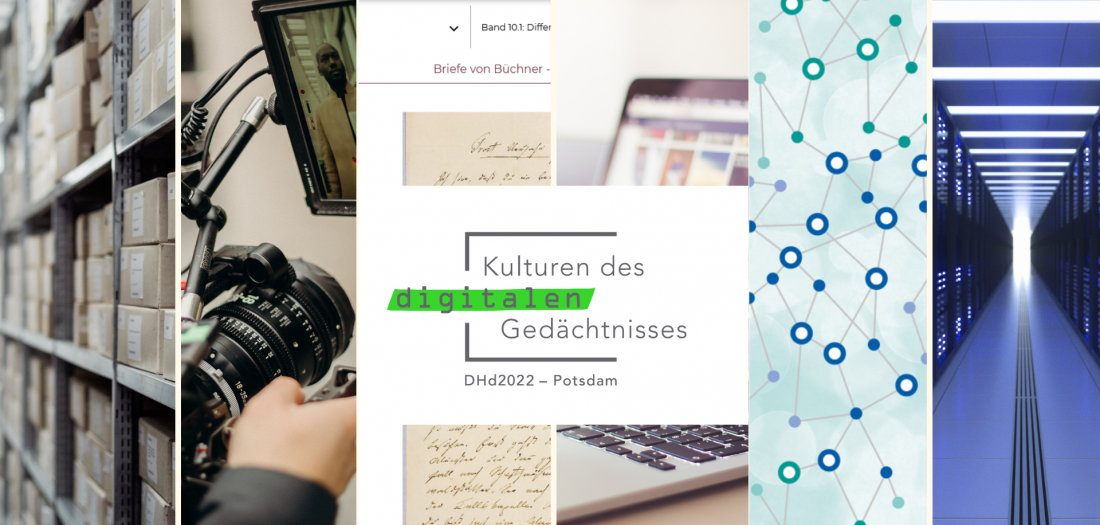#DHd2022 “Cultures of digital memory” starts
TCDH teams from computational literary studies to digital collections research represented
24.02.2022 | General, Project News, Academic exchange

© Logo of DHd2022 www.dhd2022.de, Image details from left to right: archive, video shooting, excerpt from the digital edition: Letters by Büchner - No. 72 from January 1, 1936. Computer workstation, “MiMoText” network as well as server room.
DHd2022, which was to take place under the motto “Cultures of Digital Memory” on the Kiepenheuerallee campus (Potsdam University of Applied Sciences) and the Griebnitzsee campus (University of Potsdam), will be completely virtual due to the pandemic. The renowned Potsdam Museum Barberini could be won as a cultural partner, which will be brought to life in a virtual 360° tour of the collection during an online live tour on March 9.
Cultures are based on memories
“Cultures are based on memory, on practices of archiving and transmission. Digitization has hardly foreseeable consequences for these fundamental cultural techniques. At DHd2022, we want to explore the potential of digital memory cultures as well as their flip side, such as digital forgetting,” says Prof. Dr. Peer Trilcke, spokesperson for the “Network for Digital Humanities” at the University of Potsdam and director of the Theodor Fontane Archive there. “Memory institutions such as libraries, archives or museums are currently undergoing a comprehensive process of change that enables entirely new research and usage scenarios, but also poses special challenges,” explains Prof. Dr. Heike Neuroth, Professor of Library Science at the University of Applied Sciences Potsdam, who co-chairs the Potsdam organizing committee of DHd 2022 together with Peer Trilcke.
Diverse and interdisciplinary from Computational Literary Studies to Digital Collection Research
How DH projects can function successfully in today's world, which new project approaches are being implemented, or which developments have taken place in the respective subfields of the digital humanities in the past year will be shown at DHd2022.
The Trier Center for Digital Humanities (TCDH) will be represented with several contributions from the different research areas. In their presentation “Literaturgeschichtsschreibung datenbasiert und wikifiziert?” the speakers Julia Röttgermann, Anne Klee, Maria Hinzmann, and Christof Schöch will focus on the question whether literary historiography can be formalized in the form of data triples. As part of the project “Mining and Modeling Text” (MiMoText), 30 topics were extracted from 92 French primary texts from the period 1750 - 1800 using topic modeling and mapped to multilingual, thematic concepts of a controlled vocabulary. The team will report on the workflows: the information extraction, the modeling in RDF, and the final result with example SPARQL queries.
In the session “Machine Learning in Literary Studies” (moderated by Christof Schöch), Keli Du will describe his experiences from the project “Zeta and Company” in the talk “Evaluating Hyperparameter Alpha of LDA Topic Modeling” and dive deeply into quantitative text analysis methods. Topic Modeling using Latent Dirichlet Allocation (LDA) - a generative probability model for “documents” - has been widely used in the Digital Humanities in recent years to study numerous unstructured textual data. Topic modeling requires dealing with many parameters that can affect the outcome of the modeling. Keli Du will reveal which dangers and opportunities arise in this process in her talk.
Joëlle Weis will participate with colleagues in the panel “Remembering through Networking: Digital Collection Research.” The networking of data is always also a networking of knowledge. In digital collection research, various technologies of referencing and relating open up possibilities for building a knowledge network that can be searched as needed, made accessible in its entirety, and designed so openly that it can be integrated into a global network of knowledge. Cultural heritage and thus memory culture can thus be raised - at least in quantitative terms - to a previously unseen level. That the large quantity of memory data is also accompanied by reliable and uniformly high quality remains a challenge. In the two-hour panel discussion, the speakers will enter into a dialogue with the diverse perspectives on networking with different project and methodological backgrounds.
Science graphically on point
During the poster session of DHd2022, the general public will get a quick and graphically prepared insight into the scientific projects of the participants. The TCDH teams from “Zeta and Company” and “Mining and Modeling Text” (MiMoText) show with their poster contributions which opportunities can be derived for the field of literary historiography with new technologies and how they can be successfully used by teams:
- “Contrastive Text Analysis with pydistinto - a Python Package for the Use of Different Distinctiveness Measures” | Keli Du, Julia Dudar, Cora Rok, Christof Schöch as well as.
- “Linked Open Data for literary historiography: the Mining and Modeling Text project” | Maria Hinzmann, Christof Schöch, Katharina Dietz, Anne Klee, Katharina Erler-Fridgen, Julia Röttgermann, Moritz Steffes.
Interested? Selective participation is also possible at any time after registration. Virtual participation via Zoom is free of charge. Click here for the event program and all further information!
Contact TCDH:
Prof. Dr. Christof Schöch / Prof. Dr. Claudine Moulin
Link: Programm der DHd2022

